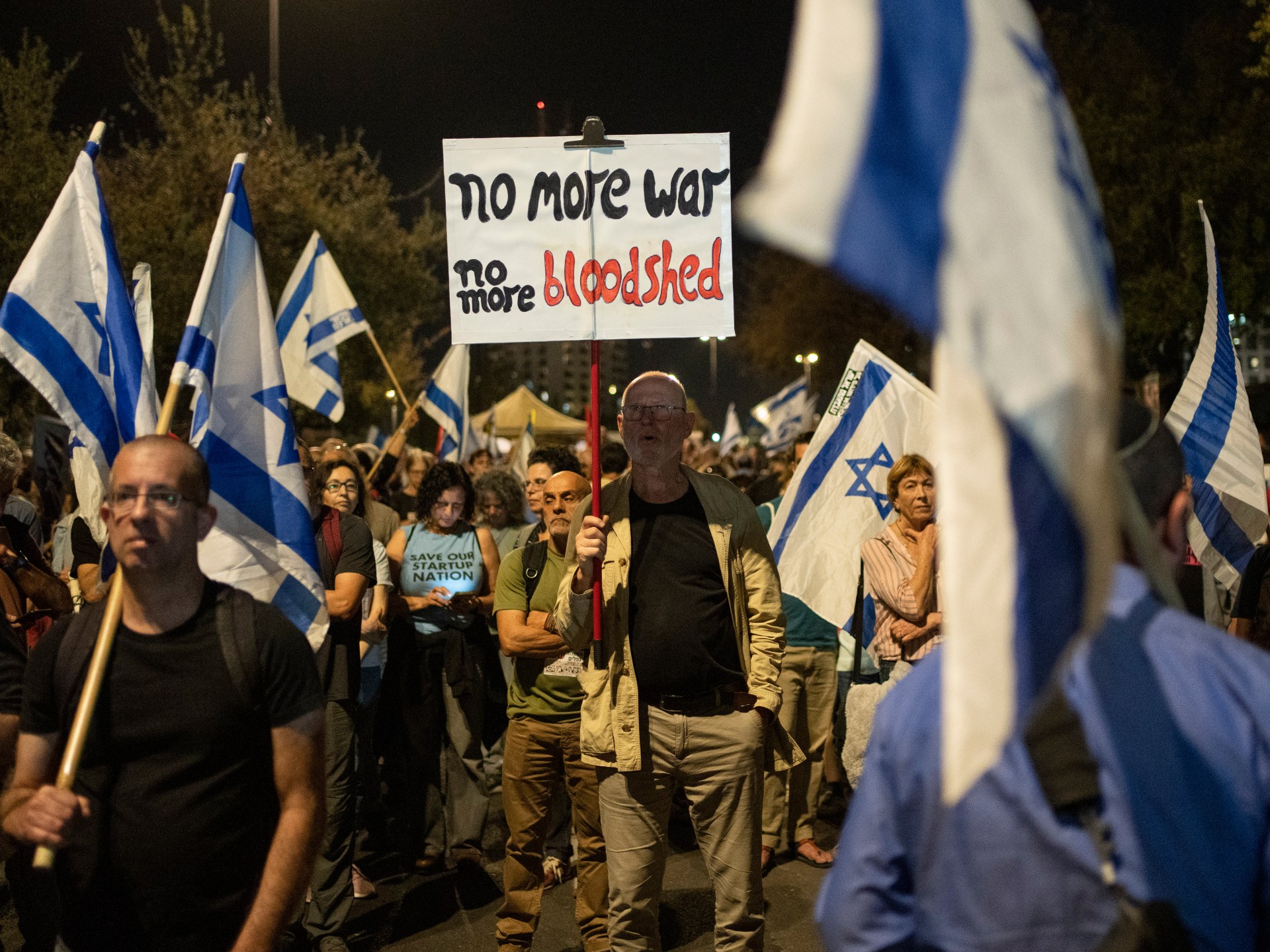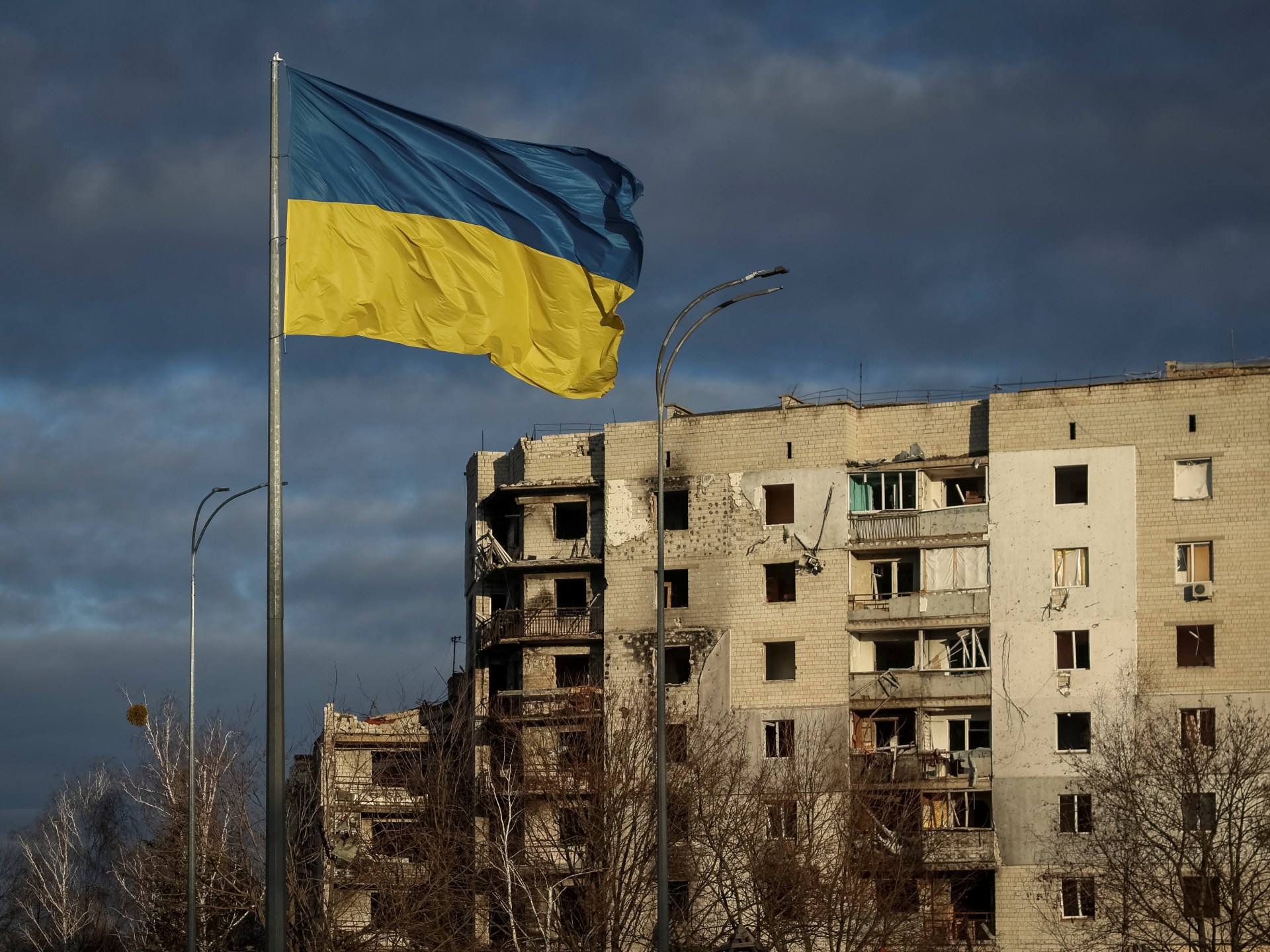Why are thousands protesting against Netanyahu’s government in Israel?
Thousands of demonstrators have gathered outside government buildings throughout Israel, nearly six months into the war on Gaza, which has killed more than 32,000 Palestinians. Protesters are calling on Prime Minister Benjamin Netanyahu to resign among other things.
Israeli police have attempted to disperse the crowds in Jerusalem with water cannon while also physically pushing back protesters in both Jerusalem and Tel Aviv.
Where are people protesting?
On Sunday, tens of thousands of people gathered outside the Knesset in Jerusalem, where a four-day protest was called on Sunday. While protests have occurred sporadically since the start of the war on Gaza, this is believed to be the largest anti-government demonstration since it began. Protesters vowed to continue for several days, with thousands flooding the streets of Tel Aviv on Saturday and Sunday.
Protests also grew in other cities in Israel. Demonstrations were also reported in Haifa, Be’er Sheva and Caesarea among other cities on Saturday.
What are protesters calling for?
Protesters’ demands have changed during the war on Gaza as discontent with Netanyahu’s government has grown.
Al Jazeera’s Salhut said that, initially, protesters called for the release of Israeli captives. Then “nearly four months into the war”, there were protests saying the government was simply not doing enough.
“Now there are full-blown anti-government demonstrations,” Salhut said. Protesters have been pushing for early elections and the removal of Netanyahu since late January.
The protesters have been demanding that the government secure a Gaza ceasefire deal immediately to allow for the return of captives taken by Hamas from Israel, early elections and the resignation of Netanyahu.
Hamas took more than 200 captives during its attack on army outposts and surrounding villages in southern Israel on October 7. Nearly half were released during a temporary pause in fighting in November in exchange for several Palestinians held prisoner by Israel.
Relatives of some of the captives are among the protesters. “I want my father-in-law home now,” Ayala Metzger, who had joined the protests in Jerusalem, told Al Jazeera’s Hamdah Salhut. “Just bring them back.”
Haggai Levin, another protester, added that the government must fulfil its duty to bring back the captives. “If they are unable to do so, maybe someone else can do that,” he said.
How significant are these protests?
The protests are adding to mounting local and global pressure on Netanyahu, who continues to assert that military action in Gaza is the only way to release the captives rather than compromise in negotiations.
In a press conference on Sunday, he said the Israeli military is ready to invade Rafah – Gaza’s southernmost town on the border with Egypt – despite criticism from other countries, including close ally the United States.
The United Nations Security Council voted in favour of a ceasefire resolution last week, on which the US abstained, allowing it to pass, placing further strain on the relationship between the US and Israel.
Could the protests make Netanyahu resign?
There are many observers who feel most Israelis agree with Netanyahu’s approach.
Former Associated Press editor Dan Perry wrote on US website The Forward, which has a predominantly Jewish audience, that there is little chance Netanyahu will face enough internal pressure from within the government to consider resigning so long as Netanyahu’s war goals include the “eradication of Hamas”.
Netanyahu’s politics resonate with most Israelis, former Knesset member and Atlantic Council fellow Ksenia Svetlova wrote in March, citing a poll by an Israeli newspaper in which 81.5 percent of respondents said they believed military pressure on Hamas was the best way to release the captives.
On the other hand, in January, the Israeli Supreme Court ruled against judicial overhauls by Netanyahu’s government that would limit the powers of the Supreme Court over the executive.
Huge protests broke out in Israel in 2023 against the proposed judicial overhaul. The court delayed a law that would make it harder to remove Netanyahu, saying the legislation was clearly crafted for personal reasons.
How has Netanyahu responded?
Netanyahu has dismissed calls for his resignation.
On Sunday night, Netanyahu underwent surgery for a hernia, Justice Minister Yariv Levin will act as prime minister until he returns.
Ahead of the procedure, Netanyahu told a press conference: “Anyone who says I’m not doing everything I can to bring back the hostages is wrong and is misleading,” adding that “while Israel has flexed its positions in the [ceasefire] negotiations, Hamas hardens its positions.”
Netanyahu has also dismissed calls for early elections, which opinion polls suggest he would lose. “The last thing we need right now are elections and dealing with elections, since it will immediately divide us,” he said at a press briefing in February. “We need unity right now.”
In January, a survey conducted by the Israel Democracy Institute showed that only 15 percent of Israelis want Netanyahu to keep his job after the war on Gaza. Twenty-three percent of respondents said they would prefer former defence minister and war cabinet member Benny Gantz to become prime minister.
A recent poll by Israel’s Channel 13 showed that if elections were held now, Gantz’s National Unity Party would take 39 seats in the Knesset, compared with just 17 for Netanyahu’s Likud Party.




